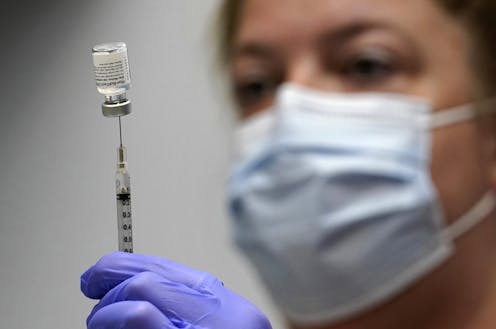FDA panel recommends limiting Pfizer booster shots to Americans 65 and older, and those at high risk of severe COVID-19
- Written by Matthew Woodruff, Instructor of Human Immunology, Emory University

The key scientific advisory council of the Food and Drug Administration has voted to deny[1] use of a “booster” shot of Pfizer’s mRNA vaccine to the general public – a move that will likely disappoint some public health experts pushing for a third dose[2] to help slow the spread of COVID-19.
In a 16-2 vote on Sept. 17, 2021, an independent committee of physicians, scientists and public health experts recommended against full use of the third dose of the vaccine, which now goes by the brand name “Comirnaty.” However, the panel did recommend the shot for Americans age 65 and older or those at high risk for severe COVID-19. In recommending against the shot for the general public, the committee cited reasons such as lack of sufficient safety data in younger age groups as well as indications that the initial doses still seem to be providing robust protection against severe illness leading to hospitalization and death. The panel also agreed in a poll – but not a formal vote – that boosters would be beneficial for certain populations, such as health care workers and others at high risk for occupational exposure.
Although the vote is not binding, it is likely that it will form the basis of a formal FDA recommendation.
As an immunologist[3] who studies COVID-19[4] and immune responses to vaccination[5], I saw the push for a booster as predictable, although the outcome of the vote was always far from certain. Over the past year, significant research[6] and public reporting[7] have focused on the durability of the immune response following the first and second doses of the COVID-19 mRNA vaccines. This work has been critical to scientists’ understanding of how long the immune responses from vaccination can provide protection, and whether that protection extends to new and emerging variants of the SARS-CoV-2 virus.
Waning antibodies
The good news is that the mRNA vaccines do appear to provide continued efficacy[8] against serious illness or death caused by new strains of the coronavirus, including the highly infectious delta variant[9].
But data on the longevity of this protection has been more mixed and is still limited in scope. Although there are indications that immune “memory” is being established[10] in vaccine recipients – almost certainly providing partial protection in the long term – the antibodies responsible for stopping the virus in its tracks before infection occurs appear to wane over the course of months[11] following the second dose.
This is not surprising to immunologists and does not mean the vaccine isn’t working. Antibodies wane as a normal course of an immune response to any vaccine. This is why you need a tetanus booster every decade or so, and why the measles, mumps and rubella vaccine is administered in three doses – not just two.
The question is simply how fast antibodies decline, and at what point they no longer provide adequate protection. At that point, an additional dose of the vaccine is recommended to “boost” the antibody numbers back up to protective levels. In this case, widespread reporting of breakthrough infections[12] – infections in individuals who have been fully vaccinated – and research citing the possibility of declining immunity[13] in populations vaccinated early in the pandemic brought discussions of the need for boosters quickly to the forefront.
Against this backdrop of mixed data, the FDA panel had to weigh the risks and benefits surrounding booster shots. While the third dose of vaccine would have been identical to those already fully approved[14] – and as such deemed safe[15] – they would not be without side effects[16] similar to those seen in the first and second doses.
In addition, serious conditions such as myocarditis[17] – an inflammation of the heart – that have been recorded in rare and isolated cases after the initial vaccine shots will likely occur following the booster as well. This, in addition to a debate around the absolute benefit of a third shot to maintain current protection levels in otherwise healthy vaccinated individuals, has led many public health officials to express concern[18] that the review is premature and risks further confusing and alienating an already divided American public[19].
Separating politics from data
With the Biden administration having already publicly backed a third dose[20] for all vaccinated Americans in August, the committee was tasked with separating the politics from the data to weigh in on whether the benefits of a booster shot outweighed the risks to an already-hesitant American public.
In rejecting the proposal, the FDA panel has signaled its confidence in the original vaccination course among healthy individuals, and will wait for additional data before identifying waning antibody levels as a significant threat to public safety. However, its support for boosting those at high risk for exposure to COVID-19 suggests a recognition that additional shots may yet be necessary to fully protect the public at large.
[Get the best of The Conversation, every weekend. Sign up for our weekly newsletter[21].]
References
- ^ voted to deny (www.nytimes.com)
- ^ public health experts pushing for a third dose (www.cnn.com)
- ^ an immunologist (scholar.google.com)
- ^ studies COVID-19 (doi.org)
- ^ immune responses to vaccination (doi.org)
- ^ significant research (doi.org)
- ^ public reporting (www.nytimes.com)
- ^ continued efficacy (doi.org)
- ^ delta variant (www.cdc.gov)
- ^ is being established (doi.org)
- ^ wane over the course of months (doi.org)
- ^ breakthrough infections (www.cdc.gov)
- ^ possibility of declining immunity (dx.doi.org)
- ^ fully approved (www.fda.gov)
- ^ deemed safe (doi.org)
- ^ side effects (theconversation.com)
- ^ such as myocarditis (www.cdc.gov)
- ^ express concern (doi.org)
- ^ already divided American public (www.kff.org)
- ^ already publicly backed a third dose (www.businessinsider.com)
- ^ Sign up for our weekly newsletter (theconversation.com)

















